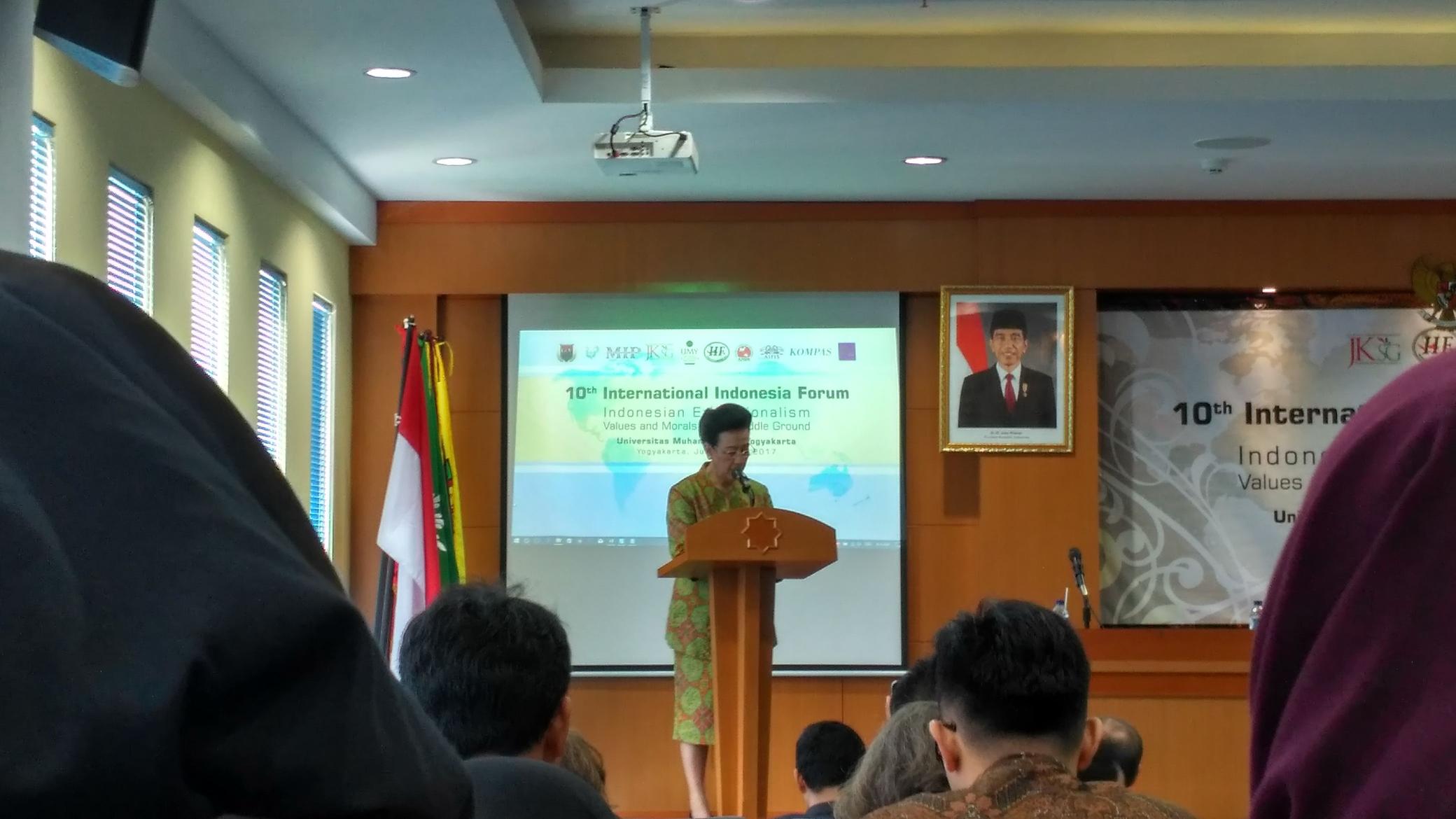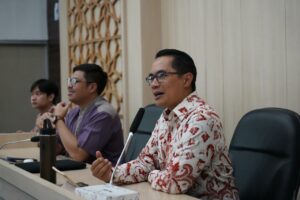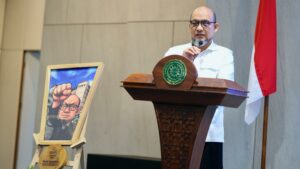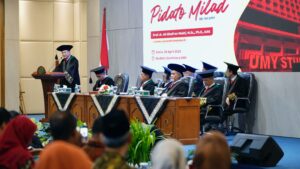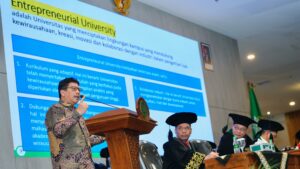Government has recently confronted a lot of issues that one of them is an economic problem. Public has criticized the great amount of debt, the huge amount of poverty, deficient tax revenue in spite of getting successful in tax amnesty, and a stagnant rupiah exchange rate in 13 thousand rupiahs. Responding the issues, Gusti Kanjeng Ratu (GKR) Hemas proposed how values and local wisdom of Javanese culture can be a solution of the economic issues. She stated her thoughts at the 10th International Indonesia Forum (IIF) conducted by Jusuf Kalla School of Government (JKSG) of Universitas Muhammadiyah Yogyakarta (UMY) on Tuesday (25/7).
According to GKR Hemas, Indonesian economy tends to become a capitalist economy. To improve Indonesia economy, government and people should engage values and local wisdom as the bases. “I think that we have to appreciate our local economic values and morals of Indonesia. A Javanese philosophy Hamemayu hayuning bawana (Beautifying the beauty of the world), which is a local wisdom and the core of Javanese teaching, is very universal and comprehensive. The philosophy can be interpreted as contexts and needs. In an economic field, the value can be construed to the economic development of Indonesia,” explained GKR.
“The goal of the philosophy is to achieve tata-titi-tentrem, meaning regularity, calmness and serenity. A person having the value of hamemayu hayuning bawana will have the three mentioned characters. That people conform, help one another, and preserve the nature shows altruism in the Javanese philosophy. This contrasts with classical economics considering that humans are economic beings who are always selfish. In brief, classical economics is opposite to identity of Javanese people. An economic model which is in line with this cultural concept is a cooperative economy, a green economy and etc.
GKR conveyed that hamemayu hayuning bawana can be a reference of working even though most of Javanese people believe that life is only temporary but they have a duty in this world to maintain truth, goodness, salvation, and sustainability of the world. “Building work ethics and developing economy of a nation or a region are a part of community empowerment. They are the most serious actions to build characters of a nation. If the philosophy of hamemayu hayuning bawana is too ideal to become a national work ethic, it can be applied in Javanese people possessing high work performance. We can see whether their work performance is underlain by this concepts or other cultural values,” maintained GKR.
She also mentioned several Javanese principles derived from hamemayu hayuning bawana. “First, Bukak dasar teaches us that the essential factor in a business is connections and customers. This notion is in line with a concept of a modern business that one regular customer is better than ten new customers. Second, there is also a Javanese idiom saying tuna sathak-bathi sanak which encourages the business practitioners to put social harmony first before a meager profit. Java ethics also teaches that in business it is not advised to take an excessive profit. Those acts should be avoided,” she added.
The issue brought by GKR is along the line with the topic discussed in IIF, Indonesian Exceptionalism: Values and Morals of the Middle Ground. Meanwhile, another speaker in this forum Chiou Syuan-yuan from National Chenghi University Taiwan presented Muslim Migrant Worker (TKW) Fatwa in Taiwan. “For the last two decades Taiwan has been taking a lot of workers from many South East Asia regions due to the lack of native workers in Taiwan. From those regions, Indonesia workers are the most,” he said.
“Taiwanese people welcomes any culture and religion. Nevertheless, there is a social gap when migrant workers live there since they are not quite familiar with the culture. Overcoming this issue, many Muslim students voluntarily assist the workers to adapt to the Taiwanese culture since Taiwan has the greatest number of Muslim students among Chinese-speaking countries. The students educate the workers, particularly Indonesian Muslim workers through conducting Islamic activities or Islamic sermons,” told Chiou.
He also contended that Indonesia gives less support to the great number of Indonesian workers in Taiwan, especially female workers. “The Indonesian Ulema Council (MUI) declared that women are forbidden to work abroad if they are nor accompanied with their spouse. This shows that government of Indonesia does not entirely support to female workers overseas. In fact, a lot of female workers come to Taiwan by themselves. I also got information on a magazine published by Indonesian community in Taiwan that government of Indonesia does not care about Indonesian community living and working at South East Asian and East Asian countries such as Japan, Taiwan, and the People’s Republic of China. This is the focus of our discussion,” stated Chiou.
